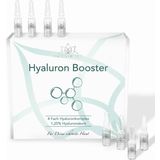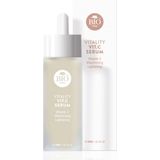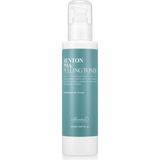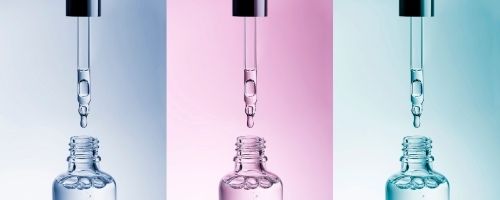Retinol, Hyaluronic Acid & Vitamin C: Active Ingredients in Cosmetics
Vitamin C, retinol, hyaluronic acid & co.
Each skin and complexion type has its own needs. To identify which cosmetics are suitable, it is necessary to know what active ingredients are, what effects they have on the skin and which active ingredients should not be combined with one another when used on sensitive skin.
Active ingredients in cosmetics & their effects
Active ingredients are ingredients that are contained in cosmetic products in an optimal concentration or slightly above the required concentration so that they have a positive effect on the skin. Based on scientific research, these active ingredients help to improve skin concerns over the long term.
The most important active ingredients in cosmetics include vitamin C and its derivatives, vitamin A and its derivatives (e.g. retinol), vitamin E, squalane, niacinamide, hyaluronic acid, azelaic acid, salicylic acid and glycolic acid. These actives have an antioxidant effect that provides free-radical protection and possess high anti-aging properties. Hyaluronic acid and squalane also protect the skin against moisture loss and can improve elasticity.
»Discover our large selection of serums for the face!
- Vitamin C: strong antioxidant that protects against harmful environmental influences, has a cell-renewing effect and makes the skin appear more even by counteracting dark spots and minor impurities.
- Vitamin A / Retinol: smoothes fine wrinkles, has an antioxidant effect, refines the complexion, promotes cell renewal and stimulates collagen production.
- Vitamin E: strong antioxidant that protects the skin from free radicals, promotes the regeneration of the protective barrier, reduces UV-related sun damage and prevents premature skin aging.
- Squalane: has an antioxidant effect, protects the skin from moisture loss and ensures a supple, soft complexion.
- Niacinamide: a vitamin B3 derivative that protects against free radicals, counteracts fine wrinkles, stimulates lipid production and the body's own collagen and elastin formation, and strengthens the skin's protective barrier.
- Hyaluronic acid: increases the moisture content of the skin, improves elasticity, can reduce the depth of wrinkles and counteracts premature skin aging.
- Azelaic acid: effective against skin impurities, removes dead skin cells and has an antioxidant effect.
- Fruit acid: refines the pores, reduces pigment spots, counteracts impurities and stimulates cell renewal.
- Salicylic acid (also known as BHA): exfoliates the upper layer of the skin, stimulates cell renewal and regeneration, and counteracts impurities.
- Glycolic acid (also known as AHA): penetrates the skin more as opposed to salicic acid, removes dead skin cells and has a skin-rejuvenating effect.
Recommended active ingredients combo for impurities: Vitamin C and acids, such as azelaic acid, salicylic acid and glycolic acid, are particularly good at counteracting impurities, stimulating cell renewal and refining the complexion. A good mix for use on pimples and dry skin is a combination of salicylic acid and hyaluronic acid.
For enhanced glow, we recommend using products infused with squalane and vitamin C.
These actives should not be mixed with one another
-
Vitamin C and AHA acids
Used together, the AHA acid can change the pH value of the products containing vitamin C thereby reducing their antioxidant effects. The effects of vitamin C are unable to fully unfold. Since both active ingredients have an exfoliating effect, the combination can lead to dry patches on sensitive skin types. It is best to use the product with vitamin C in the morning (be sure to apply sunscreen afterwards) and apply the acidic product in the evening.
-
Retinol and AHA or BHA acids
Retinol is particularly suitable as an anti-aging ingredient. It stimulates collagen production and promotes skin renewal. In combination with products that contain salicylic acid or glycolic acid, for example, retinol should not necessarily be used if you have very sensitive skin. This can overwhelm the skin and cause dryness. However, the combination is helpful for normal and oily skin types.
- AHA and BHA
These two acids should not be mixed with each other, especially when used on sensitive and very dry skin types. The exfoliating effect of glycolic acid on the upper layer of the skin and the deep-cleansing, exfoliating effect of salicylic acid (BHA) can cause extreme dryness on the skin.
Related products
-
 5.0 (4)
5.0 (4)Faces of Fey Hyaluronic Acid Booster Ampoules, 30 Pcs
- Suitable for all skin types
- Hydrates, firms & plumps the skin
- Hyaluronic acid & glycerin
$44.48 ($1.48 / Pc)Delivery by February 19
-
 5.0 (3)
5.0 (3)Bio Thai Vitality Serum Vit-C, 30 ml
- Suitable for all skin types
- Boosts skin radiance
- Contains vitamin C
$69.26 ($2,308.70 / l)Delivery by March 04
-
 4.5 (2)
4.5 (2)Benton PHA Peeling Toner, 150 ml
- Suitable for all skin types
- Including sensitive & dry skin
- Exfoliating effect & counteracts impurities
$25.73 ($171.54 / l)Delivery by February 19
Magazine Articles:
-
Get at least 1 free sample
per order -
Delivery in 3 business days.
-
We operate in a
climate-conscious manner. More than 6.000 products

